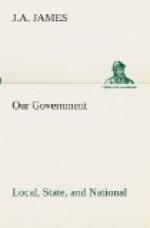Duties of the President.—Section 3. He shall, from time to time, give to the Congress information of the state of the Union, and recommend to their consideration such measures as he shall judge necessary and expedient; he may, on extraordinary occasions, convene both houses, or either of them, and in case of disagreement between them, with respect to the time of adjournment, he may adjourn them to such time as he shall think proper; he shall receive ambassadors and other public ministers; he shall take care that the laws be faithfully executed, and shall commission all the officers of the United States.
Presidential Messages.—By means of the annual message sent to Congress at the opening of the session, and special messages on particular occasions, the President is enabled to call attention to the legislative needs of the country. The plan of having a message read in each house by the clerk or secretary was introduced by President Jefferson. Presidents Washington and Adams addressed, in person, Congress assembled in joint session. Various reasons have been alleged for this change. President Jefferson was a poor speaker, and it is said that he regarded the formal address as monarchical. President Wilson read his message before Congress in the special session of April, 1913.
Enforcement of the Laws.—The most important duty of the President is to see that all laws passed by Congress are faithfully executed. Laws are useless unless they are enforced, and it is chiefly for the performance of this task that the Executive was originally created. It is not contemplated that this duty shall be performed by him in person, but through officials who are directly responsible to him. The United States marshals and their deputies exercise a wide influence in seeing that the laws are enforced. They usually act under an order from a United States court, but may, at times, act without such a writ. If necessary, the President may send the army and navy of the United States or call out the militia of the States to overcome any resistance to Federal law.
Each State possesses the power of enforcing its own laws and is of right protected in the exercise of this prerogative. In case of an insurrection, however, the State militia is sent by order of the governor to suppress it. Should they fail to restore order, the legislature, or the executive (when the legislature cannot be convened), applies to the President for military aid.[49] If the uprising has interfered in any way with the carrying out of the laws of the nation, the President may, at his discretion, send troops to suppress it without having been asked to do so by the legislature or the governor. There was a notable illustration of this point during the time of the Chicago riots, in July, 1894.
[Footnote 49: Article IV, Section 4. The United States shall guarantee to every State in this Union a republican form of government,




